Malaga: Carmen Thyssen Museum
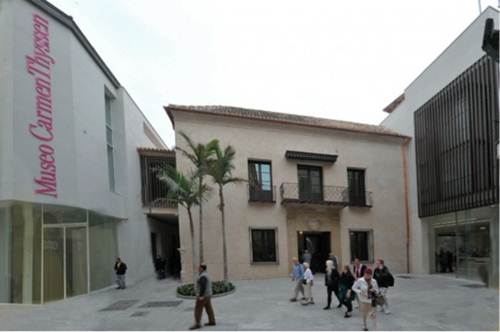
Carmen
Thyssen Museum, Malaga
Baroness Carmen Thyssen- bornemisza already
had one museum to her name, the Museo Thyssen- Bornemisza in Madrid, but that
was full up with her late husband’s collection and she needed somewhere to show
her own. For Malaga, the prospect of Dona Carmen’s artworks residing in the
city, alongside its existing 18 museums (including the Picasso Museum the Contemporary
Art Centre, and Museums of the bullfight, flamenco, anthropology, music and
airports), was too good to miss. So a knocked- about 16th- cnetury
mansion was given a dignified overhaul and a modernist annexed- attached rather
in the same way as the new wing of the Thyssen- Bornemisza museum in Madrid-
and the baroness agreed to display her collection here until at least 2025.
Like all museums based on private
collections, it is the passion of the collector, and the idiosyncrasy of her
taste, that informs Museo Carmen Thyssen. Its particular strengths are the
fascinating byways of Spanish 19th- century art, the proto-
Impressionism of Sorolla, the romantic landscapes of Regoyos and Rusinol, the
Andalucian costumbrismo of Julio Romero de Torres. If all that begins to cloy,
there is always Moner, Picasso, Matisse and Miro; and the Santa Marina by
Zurbaran, one of the jewels of the collection, is worth a few minutes of
anyone’s Costa del Sol holiday.
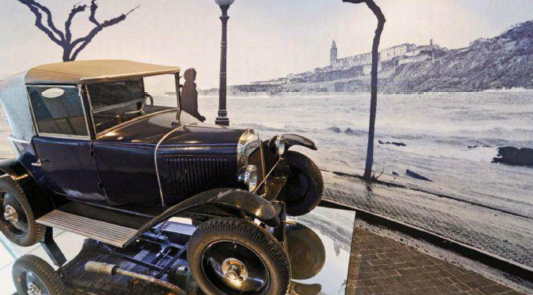
A
1920s Citroen in the museum
Plaza Carmen Thyssen, Calle Compania 10
(00 34 902 303 131;
www.carmenthyssenmalaga.org)
Open tues- Sun, 10am- 8pm. Entrance fee
$9 (concessions $4.50)
Alicante: Contemporary Art Museum
The city of Alicante is not short of
museums, but its historic old town, which for years has been crying out for
rehabilitation and cultural added- value, desperately needed a facility like
this.
The original Palacio de la Asegurada- the
city’s oldest civic building, dating from 1685- stands opposite the Basilica of
Santa Maria in the heart of the old town. Strictly speaking, the building was
recycled: it was already a museum in its previous incarnation. But architects
Sol Madridejos and Juan Carlos Sancho Osinaga have swept away the cobwebs of
the gloomy old Asegurada with a luminous and spacious new interior comprising
four stores of galleries, an auditorium and a library.
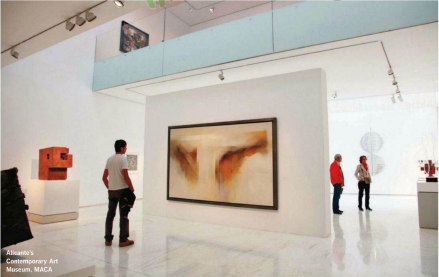
Alicante’s
contemporary Art museum, MACA
The new Museo de Arte Contemporaneo de
Alicante (MACA) is in the nature of a homage to the alicantino painter Eusebio
Sempere (1923- 1985), whose collection of Picasso, Braque, Julio Gonzalez,
JuanGris, Miro, Tapies and other luminaries of 20th- century art
forms the nucleus of the MACA’s permanent exhibition. As election of work by
Juana Frances (1923- 1990), Alicante- born and one of the most important
Spanish female artists of the 20th century, occupies the second
floor.
Plaxa de Santa maria 3 (00 34 965 213
156; www.maca-alicante.es). Open Tues- Sat, 10am- 8pm; Sundays and public
holidays, 10am- 2pm. Noentrance fee
Toledo: El Greco Museum
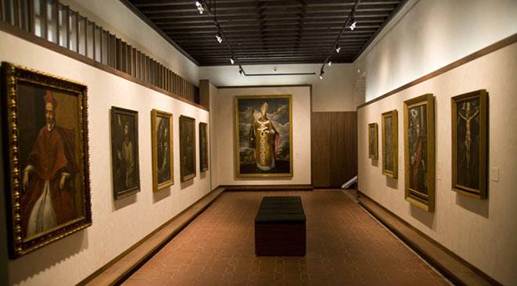
Room
at the El Greco Museum, Toledo
For many years it was believed that
Domenikos Theotokopoulos (1542- 1614), better known as El Greco, once lived in
a house on this site in Toledo’s Jewish quarter. After a four- year restoration
of the old ‘Casa Museo’, that idea has been dismissed; what remains is a fully
fledged museum devoted to the painter and his work. Originally founded by the
Marquess of Vega- Inclan in 1911 on order to father the appreciation of a
painter who was not then widely admired, thaw museums is the result of fusing a
Renaissance palace with a 16th- cebtury town house and 10th-
cnetury installations. The design respects the fabric of the building, adds
coherence and intellectual rigour to its displays, and creates a serene
environment in which to contemplate late El Greco masterpieces including the
Apostolate series, the Tears of Saint Peter, the View of Toledo, Christ the
Redeemer and Saint Bernardino (on loan from the Prado).
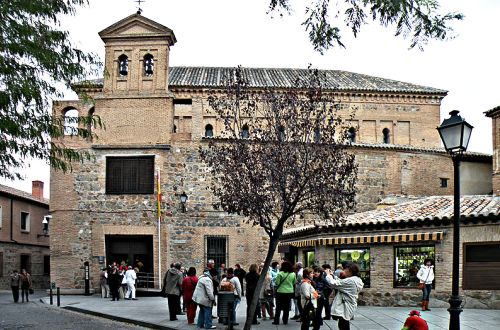
El
Transito Synagogue is one of the main attractions in Toledo Spain
The permanent exhibition takes visitors
through the various stages of El Greaco’s artistic development, with special
emphasis on the years 1600- 1614 and his relationship with the Toledo of his
time. Works by other artists of the period, Murillo, Valdes Leal, and El Greco’s
son and follower Jorge Manuel, as well as fine pottery and furniture, provide a
sense of artistic context. Whether the man lived there or not, the house gives
a strong impression of the city in its heyday; and gardens, beautifully
restored, add to the beguiling atmosphere.
Paseo del Transito s/n (00 34 925 223
665; en.museodelgreco.mcu.es). open tues- Sat, 9.30am- 6.30pm (summer 8pm);
Sunday and public holidays, 10am- 3pm. Entrance fee $4,5, free on Saturdays
after 4pm.
Best of the rest New Spanish Museums
The Museum of Basque Society and
Citizenship in San Sabastian
Museo San Telmo, Plaza Zuloaga 1 (00 34 943
481 580; www.santelmomuseoa.com)
Helga de Alvear Visual Arts Centre in
Caceres centro de Artes Visuales Fundacion Helga de
Alvear, Calle Pizarro 8 (00 34 927 626 414; fundacionhelgadealvear.es)
European Museum of Modern Art in
Barcelona Museu Europeu d’Art Modern (MEAM). Calle
Barra de Ferro 5 (00 34 93 319 5693; www.meam.es)
Museum of the Army in Toledo Museo del Ejercito, Calle Union s/n (00 34 925 238 800;
www.museo.ejercito.es)
National Museum of Energy, near Leon Museo Nacional de la Energia, Avenida Libertad 46, Ponferrada (00 34
987 400 800; www.enemuseo.org)
The personal museum of inventor,
musician, designer and writer Pep Torres in Barcelona.